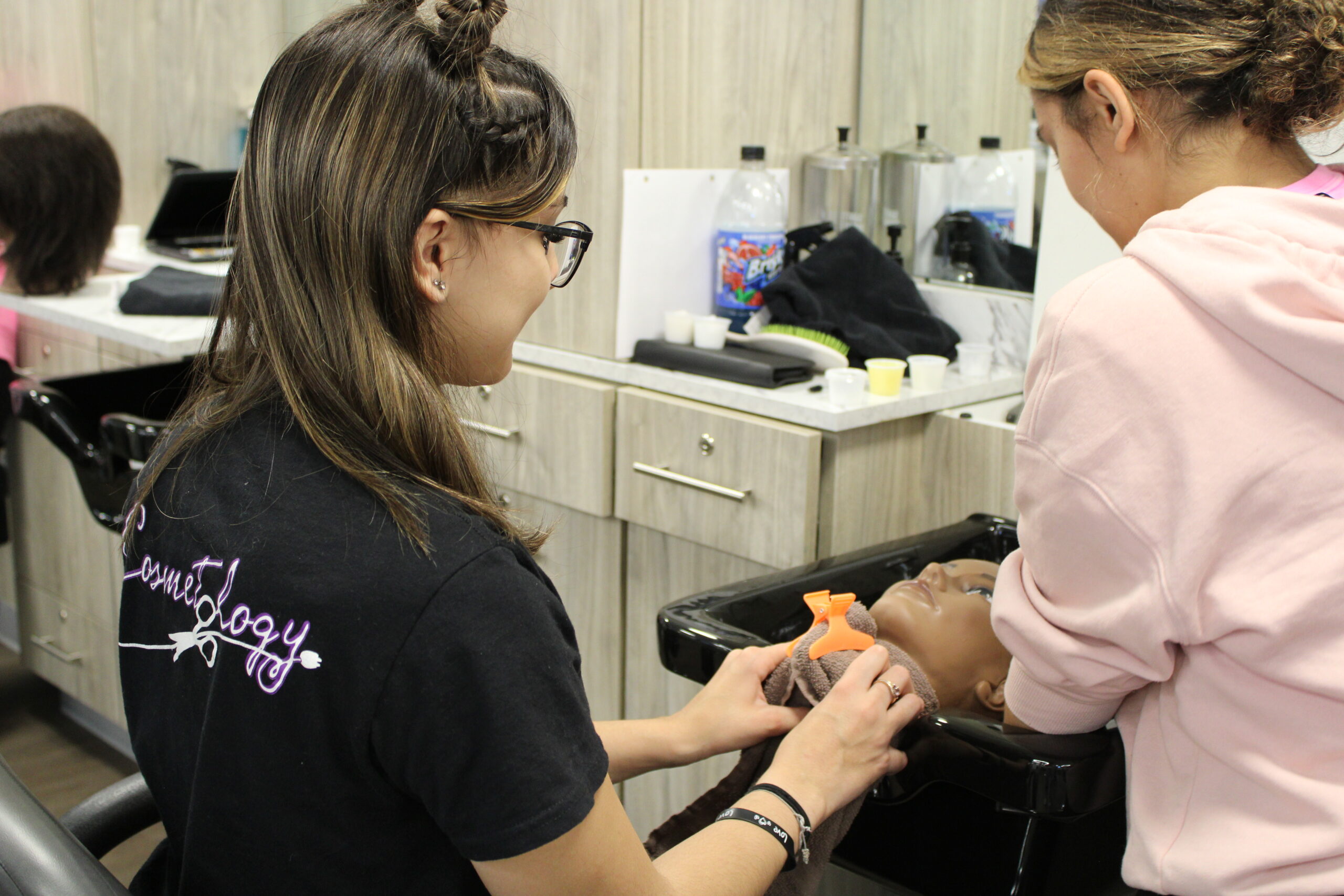2024 – 2025
Cosmetology
Guy Shepherd, Academy C Administrator – Ext. 113
Course & Program of Studies
Statement of Purpose
The Cosmetology program at GNBRVTHS is dedicated to providing students with the skills and knowledge necessary to succeed in the dynamic beauty industry. Our program emphasizes:
- Hands-On Training: Practical experience in a salon environment, allowing students to develop technical skills and artistry.
- Industry-Standard Techniques: Instruction in the latest trends and techniques in hair styling, cutting, coloring, and nail care.
- Client Services: Building strong client relationships and providing exceptional customer service.
- Business Skills: Developing essential business skills, including marketing, sales, and financial management.
- Safety and Sanitation: Prioritizing safety and sanitation practices to protect clients and stylists.
- Professionalism and Ethics: Promoting ethical conduct and maintaining a positive professional image.
By the end of the program, students will be well-prepared to enter the workforce as licensed cosmetologists or continue their education in advanced cosmetology programs.
Exploratory Program
The Freshman Cosmetology Exploratory program provides an introduction to the exciting world of cosmetology. Students will gain hands-on experience with basic cosmetology techniques, including:
- Safety and Sanitation: Understanding and practicing safety and sanitation procedures to protect clients and stylists.
- Basic Salon Skills: Learning fundamental salon skills, such as draping, shampooing, and conditioning.
- Manicuring: Performing basic manicures, including nail shaping, cuticle care, and polish application.
- Hair Styling: Practicing basic hairstyling techniques, such as blow-drying, curling, and straightening.
- Facial Treatments: Learning basic facial massage and skincare techniques.
Through hands-on activities and classroom instruction, students will develop a solid foundation in cosmetology and be prepared to advance to more complex techniques in their sophomore year.
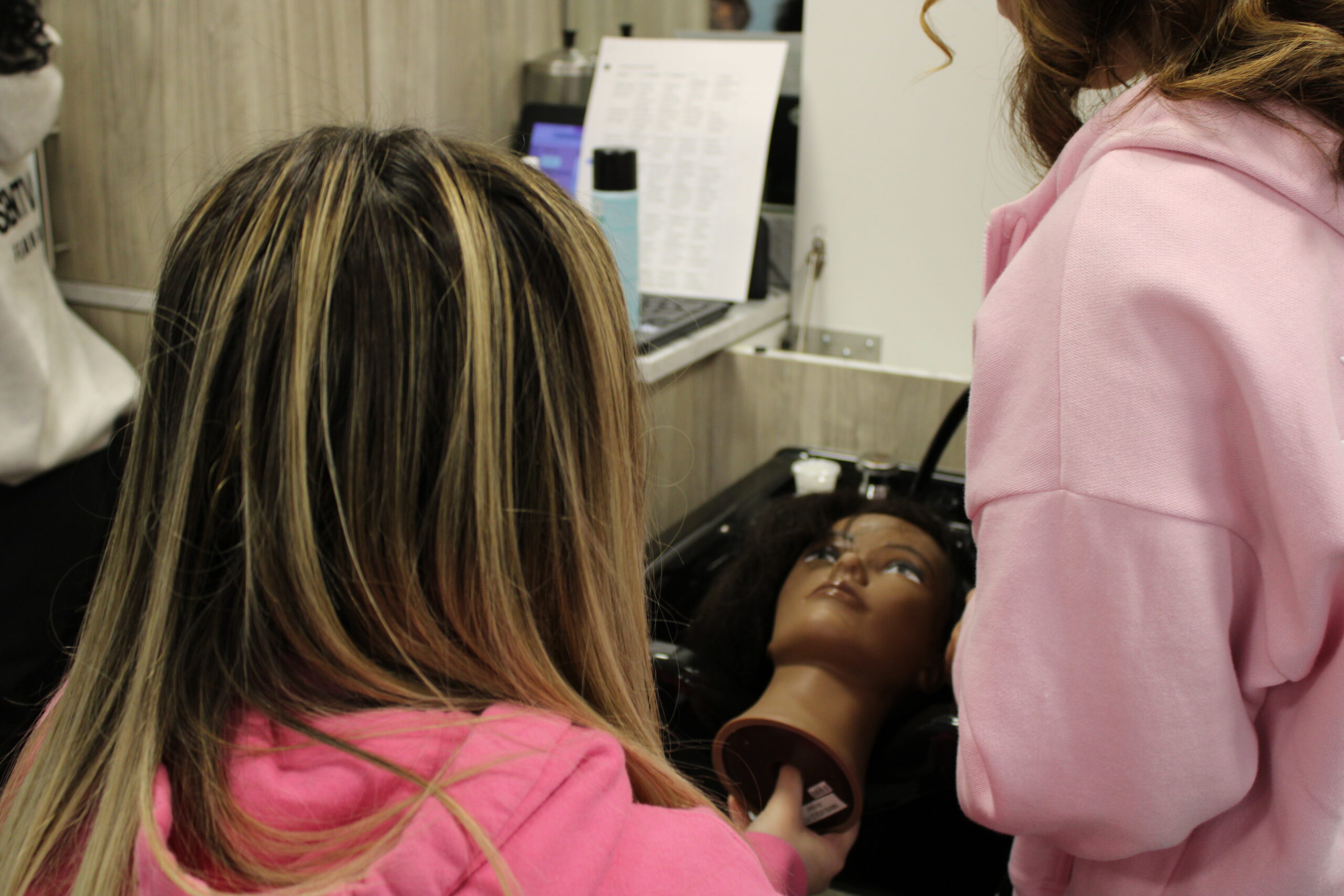
Freshman Program
Students entering the 9th grade shop are provided with the basic knowledge and skills necessary for success in the cosmetology industry.
Foundational Skills:
- Safety and Sanitation: Understanding and practicing proper hygiene and sanitation procedures.
- Basic Salon Techniques: Mastering fundamental techniques like draping, shampooing, and conditioning.
- Hair Styling: Practicing basic hairstyling techniques, including blow-drying, curling, and straightening.
- Manicuring: Performing basic manicures, including nail shaping, cuticle care, and polish application.
- Facial Treatments: Learning basic facial massage and skincare techniques.
- Professional Image: Developing a professional image, including grooming and attire.
Technical Skills:
- Advanced Hair Styling:
- Wet and Thermal Styling: Mastering advanced wet and thermal styling techniques.
- Haircutting: Learning basic haircutting techniques, such as scissor-over-comb and clipper cutting.
- Hair Coloring: Understanding color theory and applying hair color techniques.
- Hair Extensions: Learning to apply and remove hair extensions.
- Updos and Braiding: Mastering various updo and braiding techniques.
- Makeup Application:
- Applying makeup for different occasions, including natural, evening, and special occasion looks.
- Understanding color theory and contouring techniques.
- Advanced Manicuring and Pedicuring:
- Performing advanced manicures and pedicures, including nail art and spa treatments.
- Skin Care: Providing advanced facial treatments, including exfoliation, masks, and extractions.
By the end of their sophomore year, students will have a solid foundation in cosmetology and be prepared for more advanced training in their junior and senior years. They will also be able to perform a variety of salon services, including haircuts, color services, styling, manicures, and pedicures.
Sophomore Program
The Sophomore Cosmetology course builds upon the foundational skills acquired in the freshman year. Key areas of focus include:
- Advanced Hairstyling:
- Mastering advanced wet and thermal styling techniques, including blow-drying, curling, and straightening.
- Learning various haircutting techniques, such as scissor-over-comb, clipper cutting, and texturizing.
- Color Theory and Application:
- Understanding color theory and color correction techniques.
- Applying hair color, including single-process color, highlights, and lowlights.
- Manicuring and Pedicuring:
- Performing advanced manicures and pedicures, including nail art and spa treatments.
- Understanding nail disorders and diseases.
- Skin Care:
- Providing advanced facial treatments, including exfoliation, masks, and extractions.
- Understanding skin types and conditions.
- Hair Removal:
- Performing various hair removal techniques, such as waxing and threading.
- Wig Work:
- Applying and styling wigs and hair extensions.
Through a combination of classroom instruction and hands-on practice, students will develop the skills and knowledge needed to work as professional cosmetologists. By the end of the sophomore year, students will be well-prepared to advance to more complex techniques in their junior and senior years.
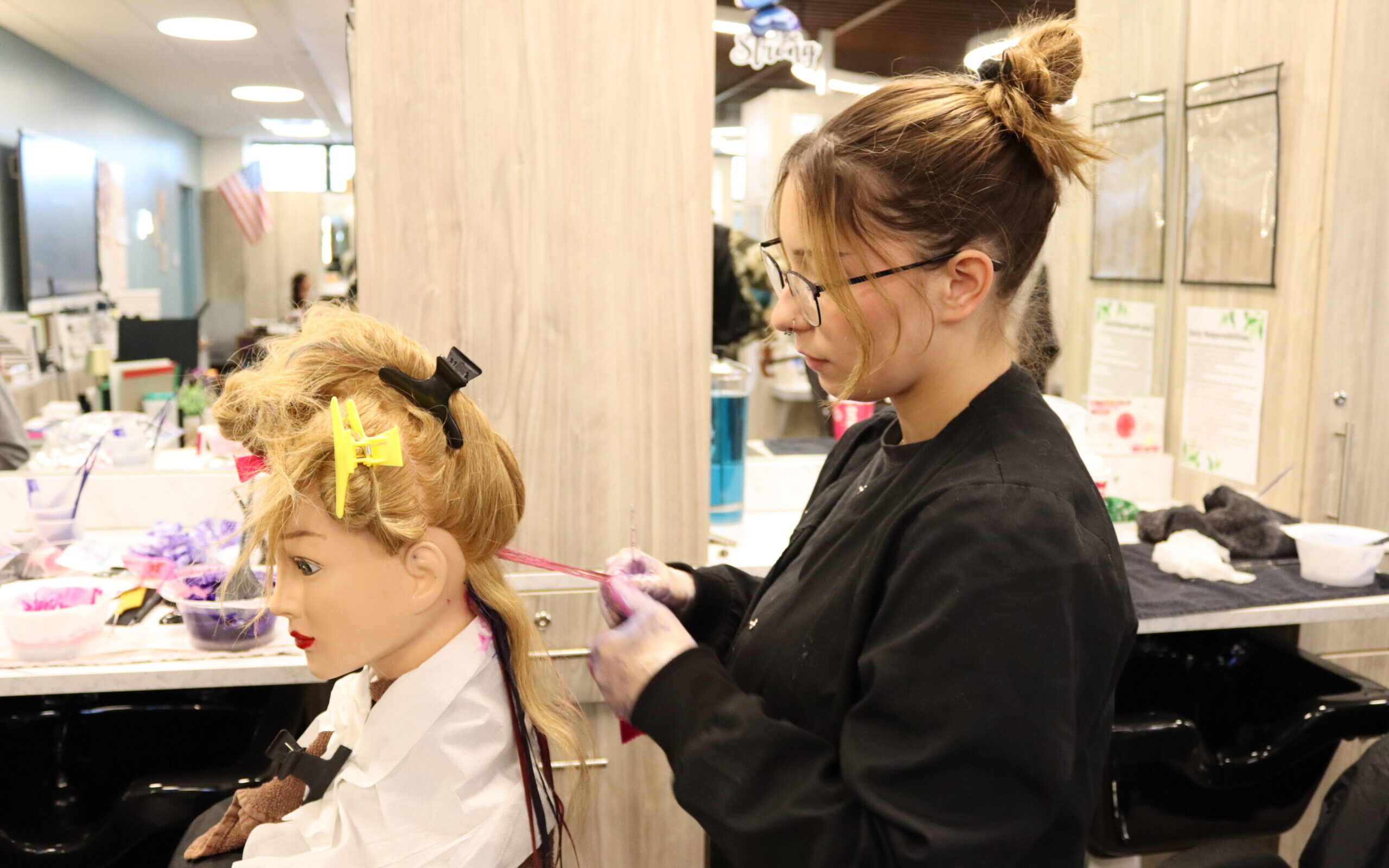
Sophomore Related Class 1
Principles of Design
The Sophomore Cosmetology theory course builds upon the foundational skills acquired in the previous years, focusing on advanced techniques and industry standards. Key areas of focus include:
- Advanced Hairstyling:
- Mastering advanced cutting techniques, including precision cutting and texturizing.
- Experimenting with creative styling techniques, such as updos, braids, and fantasy hair.
- Color Theory and Application:
- Deepening understanding of color theory and color correction.
- Performing advanced color techniques, including balayage, ombre, and color melting.
- Perming and Relaxing:
- Understanding the chemistry of perming and relaxing treatments.
- Performing perming and relaxing services safely and effectively.
- Skin Care:
- Providing advanced facial treatments, including chemical peels and microdermabrasion.
- Understanding skin conditions and recommending appropriate treatments.
- Nail Technology:
- Mastering advanced nail techniques, such as nail art and acrylic nail application.
- Understanding nail disorders and diseases.
Through a combination of classroom instruction, hands-on practice, and client services, students will develop the skills and knowledge needed to succeed in the cosmetology industry. By the end of the junior year, students will be well-prepared to sit for the state board licensing exam and enter the workforce as licensed cosmetologists.
Sophomore Related Class 2
Biological Science
This Sophomore level Cosmetology theory course is designed to prepare students for a successful career in the beauty industry. Key areas of focus include:
- Advanced Hair Cutting and Styling: Mastering advanced cutting techniques, including precision cutting, texturizing, and razor cutting.
- Color Theory and Application: Deepening understanding of color theory and color correction.
- Performing advanced color techniques, including balayage, ombre, and color melting.
- Perming and Relaxing: Understanding the chemistry of perming and relaxing treatments and performing these services safely and effectively.
- Skin Care: Providing advanced facial treatments, including chemical peels, microdermabrasion, and acne treatments.
- Nail Technology: Mastering advanced nail techniques, including nail art, acrylic nail application, and gel nail enhancements.
- Business Skills: Developing business skills, including client consultation, retail sales, and salon management.
Through a combination of classroom instruction, hands-on practice, and client services, students will develop the skills and knowledge needed to succeed in the cosmetology industry. By the end of the senior year, students will be well-prepared to sit for the state board licensing exam and enter the workforce as licensed cosmetologists.
Junior Program
This course builds upon the foundational skills acquired in the previous years, focusing on advanced techniques and industry trends. Key areas of focus include:
- Advanced Hair Color:
- Mastering advanced color techniques, including balayage, ombre, and color melting.
- Understanding color correction techniques to fix color mistakes.
- Applying advanced bleaching techniques, such as highlighting and lowlighting.
- Perming and Relaxing:
- Deepening understanding of perming and relaxing solutions and their chemical processes.
- Performing perming and relaxing services safely and effectively.
- Advanced Haircutting:
- Mastering advanced cutting techniques, including razor cutting, texturizing, and precision cutting.
- Understanding the principles of haircutting and how to create different shapes and styles.
- Updos and Braiding:
- Creating intricate updos and braids for various occasions.
- Understanding the principles of hair design and balance.
- Salon Management:
- Understanding salon management principles, including scheduling, inventory control, and customer service.
Through a combination of classroom instruction, hands-on practice, and client services, students will develop the skills and knowledge needed to succeed in the cosmetology industry. By the end of the junior year, students will be well-prepared to sit for the state board licensing exam and enter the workforce as licensed cosmetologists.
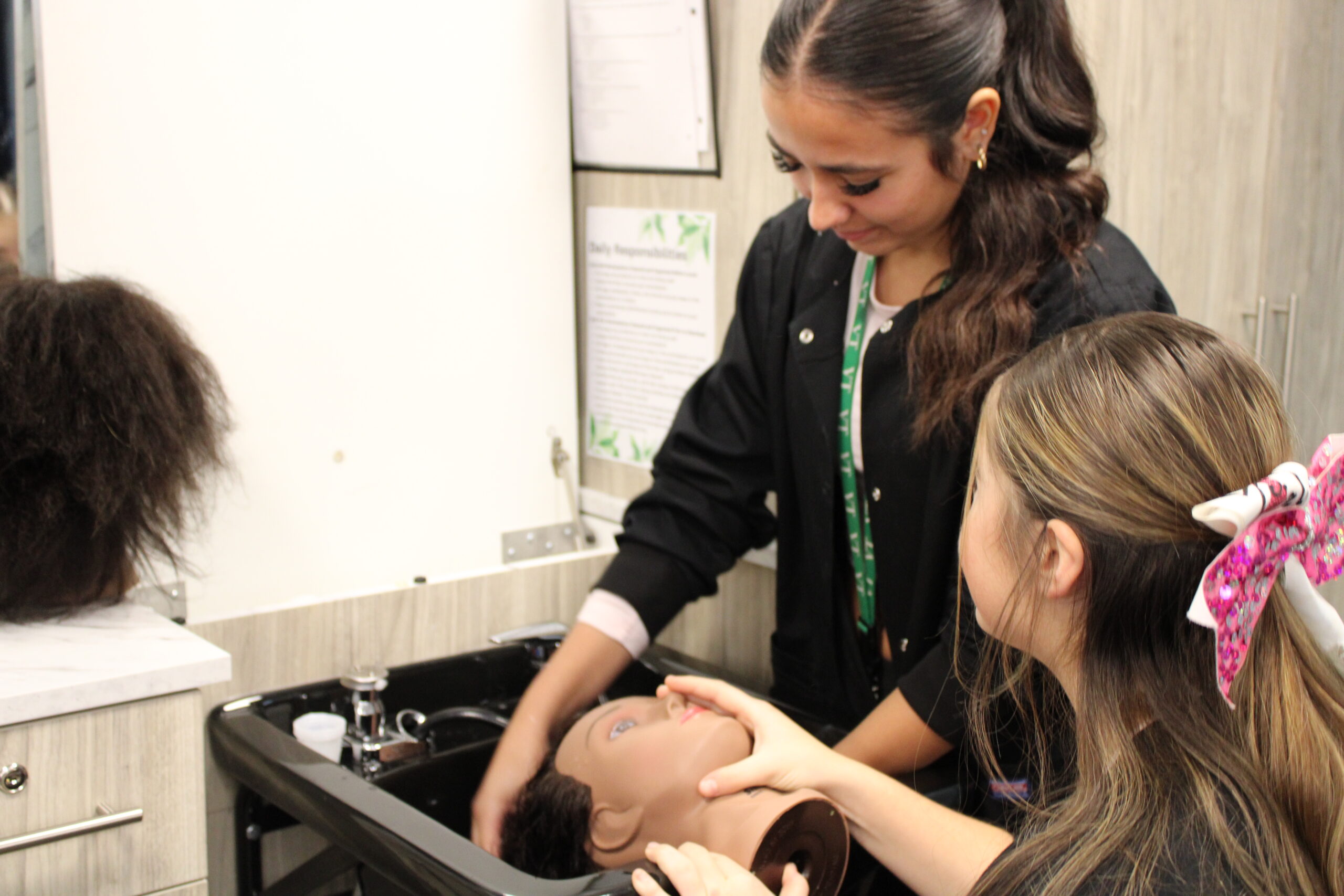
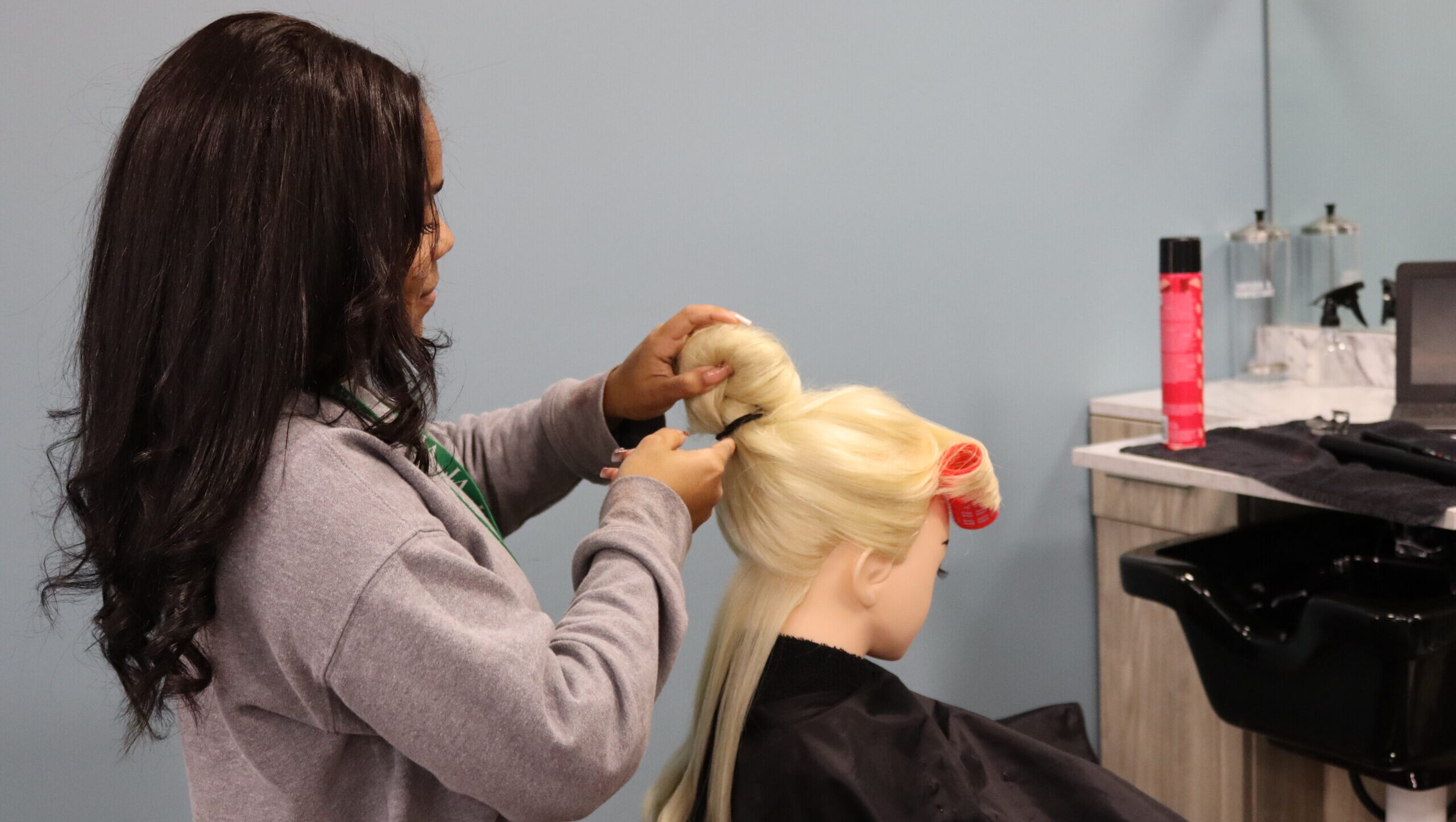
Junior Related 1
Hair Coloring
This course provides a comprehensive understanding of hair color theory and application. Key topics include:
- Color Theory:
- Understanding the color wheel and how colors interact.
- Identifying primary, secondary, and tertiary colors.
- Understanding the concept of complementary colors.
- Hair Color Levels and Tones:
- Determining natural hair color levels and tones.
- Selecting appropriate hair color products to achieve desired results.
- Color Formulations:
- Calculating the correct amount of color and developer for different hair colors and techniques.
- Mixing colors to achieve specific shades and tones.
- Hair Color Application Techniques:
- Understanding various techniques, including single-process color, highlights, lowlights, balayage, and ombre.
- Understanding the importance of strand testing and patch testing.
- Color Correction:
- Identifying and correcting color mistakes.
- Hair Lightening and Bleaching:
- Understanding the principles of hair lightening and bleaching.
- Selecting appropriate lightening products and techniques.
Through a combination of classroom instruction and hands-on practice, students will develop the skills and knowledge needed to perform a variety of hair color services. By the end of the course, students will be able to:
- Analyze hair color and identify the appropriate color formulation.
- Apply hair color techniques safely and effectively.
- Correct color mistakes and achieve desired results.
- Understand the impact of different hair color techniques on hair health.
- Adhere to safety and sanitation guidelines.
This course will prepare students to provide high-quality hair color services in a professional salon setting.
Junior Related 2
Cosmetology Health and Sciences
This course provides students with the foundational knowledge and skills necessary to succeed in the cosmetology industry. Key areas of focus include:
- Personal Health and Wellness:
- Understanding the importance of personal hygiene and maintaining a professional appearance.
- Practicing stress management and time management techniques.
- Developing healthy habits, such as nutrition and exercise.
- Communication Skills:
- Effective communication with clients, colleagues, and supervisors.
- Active listening and problem-solving skills.
- Building rapport and trust with clients.
- Anatomy and Physiology:
- Understanding the structure and function of the skin, hair, and nails.
- Recognizing common skin disorders and hair conditions.
- Applying anatomical knowledge to cosmetology practices.
- Safety and Sanitation:
- Adhering to safety and sanitation regulations to protect clients and stylists.
- Understanding the importance of disinfection and sterilization.
- Professional Ethics:
- Maintaining professional conduct and ethical standards.
- Respecting client confidentiality.
Through a combination of classroom instruction and hands-on practice, students will develop the skills and knowledge needed to succeed in the cosmetology industry. By the end of the junior year, students will be well-prepared to sit for the state board licensing exam and enter the workforce as licensed cosmetologists.
Senior Program
The Senior Cosmetology program is designed to provide students with advanced training and preparation for a successful career in the beauty industry. Key areas of focus include:
- Advanced Hair Services:
- Mastering advanced hair cutting, coloring, and styling techniques.
- Performing perming, relaxing, and chemical straightening services.
- Understanding and applying hair analysis and consultation skills.
- Skin Care:
- Providing advanced facial treatments
- Understanding skin conditions and recommending appropriate treatments.
- Nail Technology:
- Mastering advanced nail techniques, such as acrylic and gel nail enhancements.
- Understanding nail disorders and diseases.
- Salon Management:
- Developing strong business skills, including customer service, retail sales, and salon operations.
- Understanding salon marketing and advertising strategies.
Clinical Experience:
- Salon Practice: Gaining hands-on experience in a salon setting, providing services to clients under the supervision of licensed professionals.
- Portfolio Development: Creating a professional portfolio showcasing skills and accomplishments.
- State Board Exam Preparation: Preparing for and taking the state board licensing exam.
By the end of the senior year, students will be well-prepared to enter the workforce as licensed cosmetologists. They will have the skills and knowledge to succeed in a variety of salon settings, including salons, spas, and beauty supply stores.
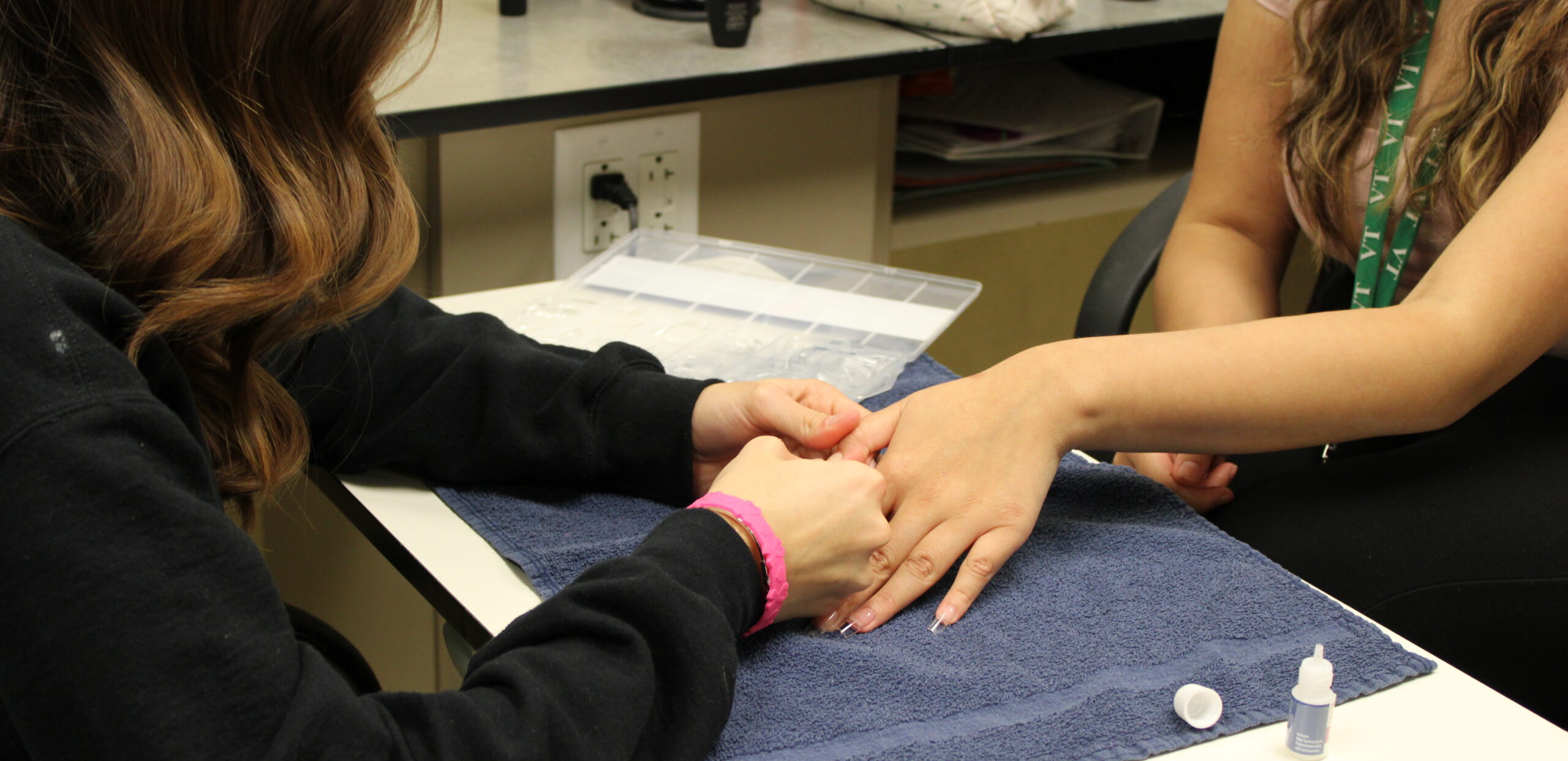
Senior Related 1
State Board Preparation
This senior-level course focuses on refining advanced techniques and preparing students for the state board licensing exam. Key areas of focus include:
- Advanced Hair Cutting and Styling:
- Understanding precision cutting techniques, including slide cutting, point cutting, and texturizing.
- Understanding advanced hairstyles, such as updos, braids, and formal styles.
- Advanced Color Techniques:
- Deepening understanding of color theory and color correction.
- Chemical Services:
- Understanding the chemistry of hair and the impact of chemical treatments.
- Skin Care:
- Understanding skin conditions and recommending appropriate treatments.
- Nail Technology:
- Understanding nail disorders and diseases.
Exam Preparation:
- State Board Exam Review: Reviewing the content of the state board licensing exam, including practical and written exams.
- Mock Exams: Taking practice exams to assess knowledge and identify areas for improvement.
- Time Management: Developing effective time management skills for the exam.
- Test-Taking Strategies: Learning effective test-taking strategies to maximize performance.
Through a combination of classroom instruction, hands-on practice, and mock exams, students will be well-prepared to successfully pass the state board licensing exam and enter the workforce as licensed cosmetologists.
Senior Related 2
Business of Cosmetology
This senior-level course focuses on the business and professional aspects of the cosmetology industry. Key topics include:
- Business Planning:
- Developing a comprehensive business plan for a salon or spa.
- Identifying target markets and analyzing competition.
- Creating financial projections and budgeting.
- Salon Management:
- Managing salon operations, including scheduling, inventory control, and staff management.
- Understanding labor laws and regulations.
- Implementing effective marketing and advertising strategies.
- Customer Service:
- Building strong client relationships through excellent customer service.
- Handling customer complaints and resolving conflicts.
- Providing professional and ethical services.
- Professional Ethics:
- Adhering to ethical guidelines and professional standards.
- Maintaining confidentiality and privacy.
- Safety and Sanitation:
- Ensuring compliance with safety and sanitation regulations.
- Preventing the spread of infectious diseases.
Through a combination of classroom instruction and hands-on exercises, students will develop the skills and knowledge needed to manage a successful salon or spa. By the end of the course, students will be well-prepared to start their own business or work as a manager in a salon or spa.
Certifications
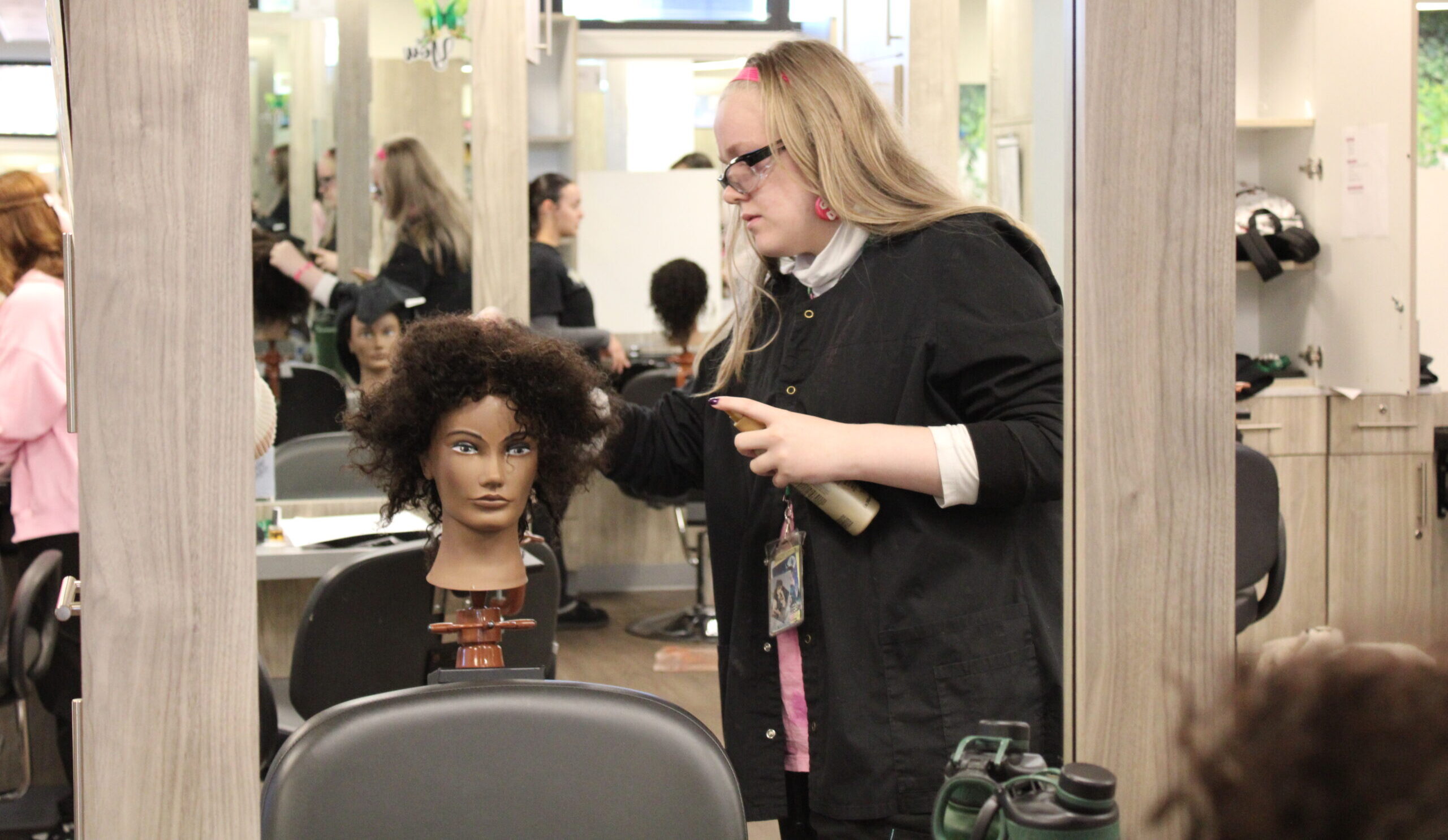
- OSHA 10
- Cosmetology State Board Licensure – Massachusetts
- Milady
- Shear Haircutting Basics
- Cue the Curls Parts 1 and 2
- Brushes Exposed
- Hair Reproduction Recreate a Look
- Infection Control
- Eyelash Extension Certification
- Hair Extensions Certification
- Nail Enhancement Application-Creative Nail/Cuccio
Career Opportunities
- Cosmetologist
- Salon Owner
- Make-up Artist
- Platform Artist
- National Product Educator
- Retail/Sales-Associate
- Stylist
- Booth Renter
- Salon Manager
- Salon Owner
- Skin Care Specialist/Aesthetician
- Make-Up Artist
- Day Spa Stylist or Technician
- Hair Stylist for TV, Movies, or Theater
- Manufacturer’s Representative
- Teacher, Private School
- Teacher, Vocational
- Department Head
- School Director
- Product/Salon Educator
- Cosmetic Chemist
- Beauty Editor Writer
- State Board Member/Inspector
Post-Secondary Education
Upon completing 1,000 hours of instruction in the Cosmetology Clinic, students are prepared to take the state licensing examination in Cosmetology. Post-secondary degree programs are available in.
- Bristol community college
- UMass Dartmouth
